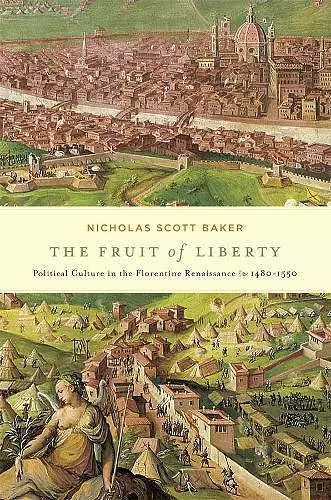The Fruit of Liberty
Political Culture in the Florentine Renaissance, 1480-1550
Format:Hardback
Publisher:Harvard University Press
Published:4th Nov '13
Currently unavailable, and unfortunately no date known when it will be back

In the middle decades of the sixteenth century, the republican city-state of Florence--birthplace of the Renaissance--failed. In its place the Medici family created a principality, becoming first dukes of Florence and then grand dukes of Tuscany. The Fruit of Liberty examines how this transition occurred from the perspective of the Florentine patricians who had dominated and controlled the republic. The book analyzes the long, slow social and cultural transformations that predated, accompanied, and facilitated the institutional shift from republic to principality, from citizen to subject.
More than a chronological narrative, this analysis covers a wide range of contributing factors to this transition, from attitudes toward office holding, clothing, and the patronage of artists and architects to notions of self, family, and gender. Using a wide variety of sources including private letters, diaries, and art works, Nicholas Baker explores how the language, images, and values of the republic were reconceptualized to aid the shift from citizen to subject. He argues that the creation of Medici principality did not occur by a radical break with the past but with the adoption and adaptation of the political culture of Renaissance republicanism.
In a lucid and lively way, Baker has managed to reveal untold parts of what would seem to be a well-worn story. Rather than seeing a pronounced break between republic and principate in Renaissance Florence, Baker emphasizes continuity of language and images, as well as of office holders themselves, from the late fifteenth to the mid-sixteenth century. -- Sharon Strocchia, Emory University
The Fruit of Liberty provocatively reinterprets the significance of Florentine political culture in the late Renaissance. By interrogating the apparently sharp contrast between republican and ducal Florence, Baker reveals hidden continuities in the Florentine experience that help explain the triumph of post-Renaissance absolutism just as much as the persistence of republican language and traditions. -- Mark Jurdjevic, Glendon College, York University
- Nominated for Phyllis Goodhart Gordan Book Prize 2015
- Nominated for Roland H. Bainton Book Prize 2014 (United States)
- Nominated for Herbert Baxter Adams Prize 2014
ISBN: 9780674724525
Dimensions: unknown
Weight: unknown
382 pages